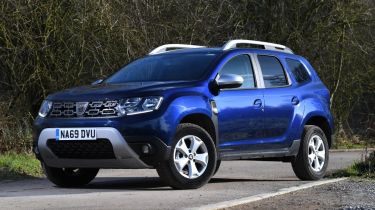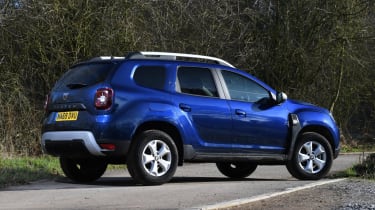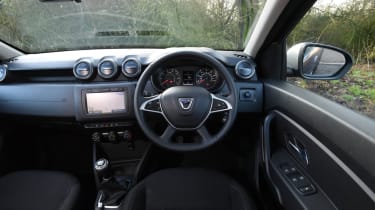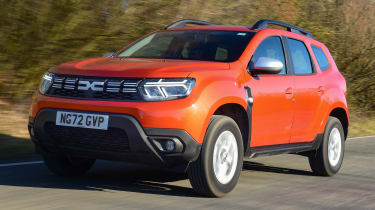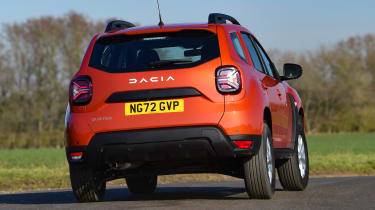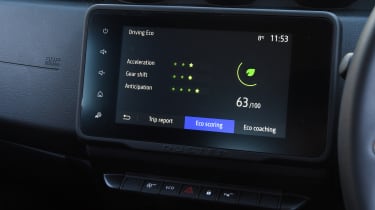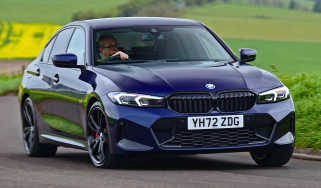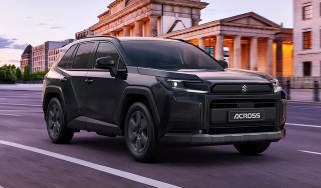Used Dacia Duster (Mk2, 2018-2024) buyer's guide: puts more expensive SUVs in the shade
Our full used buyer’s guide on the Dacia Duster, covering the Duster Mk2 that was on sale between 2018 and 2024
Verdict
The Dacia Duster isn’t as ‘shockingly affordable’ as it once was, but compared with its key rivals, it still represents impressive value and it remains easy to recommend. When we ran a Mk2 Duster Blue dCi 115 Comfort for nine months, we were surprised at how wide-ranging its talents were. We found the quality to be on a par with much more costly rivals, while its comfort levels were often superior, and its practicality was excellent. So it came as no surprise when we pitted a Duster against the MG ZS and the Nissan Qashqai in two separate tests, that the Dacia came out on top. The Duster Mk2 is a car that you can buy with your heart as well as your head.
When Romanian state-owned brand Dacia arrived in the UK in the early eighties, it hoped to sell 10,000 cars per year. But instead the marque retreated soon after, with few of its Denem saloons and estates finding buyers. The firm also imported the no-frills Duster off-roader, which again sold in tiny numbers before Dacia disappeared from these shores, seemingly forever.
By 1999, Dacia had become a subsidiary of Renault, but it wouldn’t be until 2013 that the Romanian brand returned to the UK with an all-new Duster. Since then Dacia has gone from strength to strength here, largely because its cars are so much cheaper to buy than virtually all its rivals.
History
The Duster Mk2 (Mk3 if you include the eighties cars) reached UK showrooms in July 2018, with a choice of 1.6-litre SCe 115 petrol or 1.5-litre Blue dCi diesel engines, both rated at 114bhp. Within weeks, two more petrol engines had joined the range: the 1.3-litre TCe 130 and TCe 150 with 128bhp and 148bhp respectively.
In August 2019 the 99bhp 1.0-litre three-cylinder TCe 100 superseded the SCe 115. A Bi-Fuel (petrol and LPG) version of the TCe 100 arrived in February 2020.
Used - available now

2021 Dacia
Duster
22,049 milesManualPetrol1.3L
Cash £11,299
2023 Dacia
Duster
36,110 milesManualPetrol1.0L
Cash £13,295
2017 Dacia
Duster
62,615 milesManualDiesel1.5L
Cash £6,450
2022 Dacia
Duster
48,098 milesManualPetrol1.3L
Cash £11,151An updated Duster was available from September 2021, with a refreshed front-end design, a redesigned dashboard with improved infotainment, and extra driver- assistance systems. A six-speed automatic transmission – dubbed EDC, for Efficient Dual Clutch – was also available for the first time, but this could only be specified with the TCe 150 petrol engine. It went off sale in 2024 when the Duster Mk3 arrived in the UK.
Prices
Of the 400 or so second-hand Mk2s that we found for sale, one in eight was a diesel. Autos are extremely rare; we found just 13 of them, while Dusters with four-wheel drive are even rarer.
You can buy a used Dacia Duster for as little as £6,000 through our Buy a Car service.
Which one should I buy?
We’d avoid the SCe 115, because its non-turbo engine provides leisurely performance, but any of the TCe engines will feel more perky. The TCe 130 is the sweet spot in terms of economy and performance, but don’t overlook the Blue dCi 115, which is frugal and offers decent pace.
The ultra-basic entry-level Access is incredibly rare and the only piece of ‘luxury’ kit that it features is electric front windows. Move up to the Essential spec and you get a radio, Bluetooth and air-con, while the Comfort has upgraded interior trim, a trip computer, cruise control, 16-inch alloys, privacy glass, powered rear windows, a seven-inch touchscreen with navigation, a rear parking camera, and heated electrically adjustable door mirrors. The Prestige adds climate control, 17-inch wheels, keyless entry and blind-spot detectors.
Alternatives to the Dacia Duster
The Dacia’s closest rival in terms of price and size is the MG ZS, which is also good value, but isn’t as sophisticated as most of its rivals. The Duster straddles two segments: mini-SUV and compact SUV. The former includes the Citroen C3 Aircross, Peugeot 2008, Nissan Juke, Renault Captur, Mazda CX-3 and SEAT Arona, along with the Kia Stonic, Hyundai Kona, Ford Puma and Vauxhall Crossland.
Move up a segment and you can pick between the Nissan Qashqai, Hyundai Tucson, Kia Sportage, SsangYong Tivoli and SEAT Ateca, as well as the Ford Kuga, Peugeot 3008, Skoda Karoq and Mazda CX-5. Most of these alternatives feel more sophisticated than the Dacia, but you’ll pay more for them, and they’re no more practical and not necessarily easier to own.
What to look for
Spare tyre
A full-size spare fits under the boot floor of all Dusters, apart from the Bi-Fuel. It was an extra-cost option across the range.
Safety
Poor Euro NCAP results don’t reflect structural weakness; a lack of tech such as lane-keep assist and some airbags means it can’t get five stars.
Warranty
The standard three-year/60,000-mile warranty can be extended cheaply, giving up to six years or 100,000 miles of cover.
Towing
The Duster Blue dCi 115 won a tow-car award in 2019. Initially, most Dusters were rated at 1,500kg, but in 2022 this was reduced to no more than 1,200kg.
Reliability
The Duster performed well in recent Driver Power surveys, and although Dacia came 27th out of 30 manufacturers in our latest brand poll, with 27 per cent of owners reporting first-year faults, we think most of the problems were with other models.
Interior
Entry-level Dusters are astonishingly basic, although mid-range models are far plusher and will be much easier to sell on. Buy at least a Duster Essential if you want such niceties as a 60:40 split-folding rear seat, plus height adjustment for the driver’s seat and steering wheel.
Some switchgear is oddly placed, but all Dusters have plenty of room for five adults, and boot space is generous, at 445/1,623 litres, although four-wheel-drive models cut this to 411/1,614 litres.
Running costs
Dusters need to be serviced at 12 months or 18,000 miles, theoretically alternating between A (minor) and B (major). However, for those who cover high mileages, it’s recommended that the two services are combined.
The A service is just a cabin-filter change, whereas the B service includes engine oil and filter, plus checks of the car’s fluid levels and various systems. Priced separately, the A service costs £99 and the B is £179, but dealers will combine them for £199. As well as this, the brake fluid needs to be replaced every three years, at £98, and the coolant every five years or 90,000 miles, at £110. The majority of the Duster’s engines are chain-driven, however 1.5-litre diesel has a cam belt and will need to be changed after 90,000/six years at a cost of £799.
Recalls
Dacia has a pretty good record when it comes to recalls, because across its entire model range, the brand has issued only a dozen campaigns after its return to the UK a decade ago. Since the Duster Mk2 was launched in summer 2018, Dacia has issued six of these recalls, but only one of them was aimed at the Duster Mk2.
That campaign was launched in November 2020 and it affected just a few early Dusters built up to October 2018. It’s hard to say how many Dusters were recalled, because of the 2,611 vehicles included, there were also some examples of the Sandero and Logan.
The problem centred on the ignition switch on affected models, which might need to be replaced. This was because the car key might not disengage properly if it jammed in the start position.
Driver Power owner satisfaction
The Duster Mk2 made its Driver Power debut in the 2021 new-car survey in 16th place out of 75, and followed this with an even more impressive 14th in 2022. A top spot for value should come as no surprise, but fifth for the usability of the infotainment is unexpected. Other highlights include the running costs, safety features and ergonomics; owners don’t like the cabin quality, performance or seat comfort so much.
What do owners think?
Here’s what owners in the 2024 Driver Power survey thought of the Dacia Duster Mk2.
| What they like | What they don't like |
| “This is my second Duster. The amount of car you get for the money is fantastic. I just love her all over! | “I wish Dacia would offer a four-wheel-drive petrol, like they do in other markets. I don’t want a diesel!” |
| “Wherever I’m driving, on my own or with my family, the Duster is ideal. Quite an achievement for a £16k car!” | “The interior could feel a bit more upmarket, especially the floor mats, which move in the footwells.” |
| “Great audio quality. It’s not far off the Harman Kardon system in my Volvo S90, and that was an £800 option.” | “My biggest bugbear is the poor fuel economy, especially as acceleration isn’t all that great.” |
| “The Duster is a keenly priced SUV that’s spacious and good to drive. I’ll buy another one next year.” | “The front seats aren’t supportive on long journeys, and those in the back don’t have enough legroom.” |
| “Our Duster has been far more reliable than our previous VW Group cars, all of which were new.” | “The rear seats don’t fold to give a completely flat load bay, which is annoying if carrying large items.” |
| “For the price, cabin design and quality are both good, and thanks to the ample glass area and big mirrors, visibility is great. However, thick A-pillars are intrusive if emerging from junctions.” | |
| “The power steering is light and positive, which makes long drives and manoeuvres a breeze. The ride quality is better than the Sandero we had before, although on rough roads it can still be a bit crashy.” | |
| “There’s enough space for two adults, two children and a dog. There are plenty of cubbies in the cabin and the boot has never failed me – it has enough space no matter how much luggage we have, as long as the dog is on the back seat!” |
Dacia Duster: what we said
Extracts from our Dacia Duster test drive in February 2024
The Dacia Duster offers such excellent value for money, you have to wonder why you’d ever spend the extra on a more expensive model. It’s not the most inspiring car to drive, and the interior is lacking in sparkle, but in just about every other respect the Duster is able to hold its own in an increasingly competitive market.
The second-generation Duster received a facelift in 2021, with updates to its exterior design, interior trim and infotainment system all helping to keep it competitive, while Dacia continues to offer the option of all-wheel drive which means the Duster could be the best value proper off-road car on the market.
Engines, performance and drive
The Dacia Duster doesn’t offer razor-sharp dynamics or strong performance, but that’s not really the point of this kind of vehicle. Besides, the Duster’s talents lie elsewhere.
The Mk2 Duster sits on the same platform as the previous model: a stretched version of the Nissan Juke’s underpinnings. This makes it quite an old car underneath, and it does suffer from a combination of a fair bit of body roll and dull, lifeless steering. The result is a vague and detached driving experience, and its inadequate soundproofing means the Duster can be a tad noisy.
But that’s where most of the problems end, because the light steering makes it easy to manoeuvre around town, while the raised driving position gives a commanding view of the road ahead. However, during our test, we found the car's basic architecture beginning to show its age, with a noticeable amount of vibration felt through the steering wheel and pedals, while there was too much wind noise from around the A-pillars.
Otherwise, the Duster is a pleasant car to drive. A six-speed manual gearbox is fitted as standard to all but the 148bhp petrol-engined 4x2 model. The six-speed dual-clutch auto works smoothly enough, although it will sometimes choose to hold onto a gear when you'd prefer a higher ratio.
0-62mph and top speed
There are two TCe petrol engines to choose from: a 1.0-litre three-cylinder or a 1.3-litre inline-four. The larger 1.3-litre unit is our pick of the range as it’s barely any less economical than the smaller three-cylinder, but is far smoother, particularly at idle. It’s more powerful too, producing either 128bhp or 148bhp, which is enough to provide perfectly adequate performance.
The more potent TCe 150 unit will propel the Duster from 0-62mph in 9.7 seconds, giving the SUV the clout to take on models costing several thousand pounds more. Meanwhile, the TCe 130 takes 10.6 seconds to complete the same benchmark sprint.
For those unconcerned with extra power, the entry-level 1.0-litre petrol engine produces 90bhp and takes 13.1 seconds to reach 62mph, so it feels slightly sluggish.
The slightly unconventional option of the Bi-Fuel LPG system provides an alternative to petrol power. This comprises a 1.0-litre turbo three-cylinder engine that can run on either petrol or LPG. The Duster TCe 100 Bi-fuel produces 99bhp in all, and takes 13.8 seconds to get from 0-62mph.
MPG and CO2
All current versions of the Dacia Duster are capable of achieving over 40mpg on the WLTP combined cycle. Interestingly, the bi-fuel model has the lowest official figure at 44.1mpg. However, the lower price of LPG (liquefied petroleum gas) compared to petrol could still mean you make bigger savings in the long run. The TCE 90 and 130 claim a maximum fuel economy figure of up to 45.6mpg.
When it comes to CO2 emissions, all variants are once again very similar in their performance, but none are exactly class-leading. The least polluting engine is the TCE 90 unit, with a claimed figure of 140g/km. The worst performer is the Bi-Fuel model, which emits 145g/km when running on petrol power – although this figure drops to 126g/km when running on LPG. That’s good for the environment, but not for your wallet, because it’s taxed on its emissions when running on petrol.
When we drove a Duster TCe 130 4x2 head-to-head against a previous-generation Nissan Qashqai in our twin test, the Dacia proved to be the more frugal of the two, returning 42.4mpg compared to 38mpg in the Nissan. Based on that figure, the Duster could cover 466 miles on a full tank.
Interior design and technology
The second-generation Dacia Duster looks far more upmarket than its predecessor. It’s an evolution of the old car, albeit with a sharper, more muscular look, but not a single body panel has been carried over. Its mid-life facelift also injected some additional style with tweaks to the exterior and upgrades inside the cabin. In 2022, Dacia refreshed its brand identity and added a new badge design.
Entry-level Essential models feature simple steel wheels and black exterior door handles, mirrors and roof bars. Expression spec cars have more appealing 16-inch alloy wheels, body colour door handles and silver mirrors.
Journey trim adds 17-inch ‘diamond-cut’ rims and contrasting Megalith Grey front and rear skid plates, door mirrors and roof bars, while upgrading to the top-of-the-range Extreme model gets you black 17-inch rims and Copper Brown exterior details, as well as the option of Cedar Green paint.
Dacia has improved the overall cabin quality, too. The comfortable seats benefit from higher-quality upholstery and a good range of hard-wearing plastics. It’s not what you’d call luxurious, but it’s hard to find fault with the fit and finish, especially considering the price point.
Overall, the cabin design is more functional than inspiring – especially in entry-level Essential trim. The ‘piano-style’ controls below the air vents are a nice touch, though. You'll need to upgrade to Expression, Journey or Extreme trim if you want a touchscreen in your Duster, but every model does come with Bluetooth, a DAB radio and two USB ports.
Sat-nav, stereo and infotainment
The base Essential car has a basic audio set-up with no media display, although it does include a radio/CD with MP3 connectivity, Bluetooth and steering wheel controls. Expression, Journey and Extreme trim models all have an eight-inch infotainment screen, a DAB radio and Apple CarPlay and Android Auto.
Journey and Extreme also include integrated sat-nav, but we expect most people will just use their preferred navigation app on their phones, which you plug in using the two USB ports behind the gear lever.
The Duster’s infotainment is simple but functional, like the rest of the car. The graphics are chunky, and the menus are easy to use. The lack of needless extras means getting acquainted doesn’t take long.
The system might look very old-fashioned considering this is a factory-fresh car, but start mirroring your smartphone, and it works perfectly well. We did find the screen is a little too bright at night, though, even in the dimmest setting, and it’s not very sharp.
Practicality, comfort and boot space
Practicality is one area in which the Dacia Duster excels, especially when you compare it to city cars and superminis in the same price range. Another advantage is the 210mm ground clearance, which will be helpful in the urban jungle.
The Duster’s door pockets are a decent size, with a cup holder and storage tray in front of the chunky gearstick and another tray between the front seats. The glovebox size is little more than adequate, but you do get a handy tray running along the top of the dashboard in front of the passenger seat. All but the base model comes with a useful 1.1-litre storage bin and extra USB ports at the rear.
Size
At 4,341mm long and 1,804mm wide (excluding the door mirrors), the Dacia Duster is just 53mm shorter and 31mm narrower than the Nissan Qashqai. The height varies depending on whether you opt for roof bars, but even in its shortest guise (1,621mm), the Duster is taller than the Qashqai (1,595mm).
Leg room, head room & passenger space
Those generous proportions translate into a good-size cabin. You step up into the Duster, rather than down like you do into a standard hatchback, which cements the SUV feel. Open the tall, wide doors to reveal a large passenger compartment to seat five adults. Head-, leg- and knee room are adequate regardless of where you’re sitting, while adults could sit three abreast in the rear without a problem. The outer rear seats also feature ISOFIX points for child seats.
Boot
The Dacia Duster has a practical boot, offering far greater luggage capacity than you’d find in a hatchback of a similar price. For maximum volume, opt for the 4x2 model, which offers 445 litres with the rear seats in place or 1,623 litres with the seats folded down.
In the 4x4 models, the capacity drops to 411 litres – or 376 litres with a spare wheel fitted. With the seats folded down, this space extends to 1,614 and 1,559 litres, respectively. For context, the Nissan Qashqai offers a maximum of 1,585 litres.
The rear bench splits 60:40, but the seats don’t fold flat, which might be an issue when carrying long, bulky items.
The loading lip is of a height you’d expect in an SUV, while the boot is well-proportioned, with no intrusion from the wheel arches. It’s a pretty basic boot, although an interior light is standard across the range.
Come and join our WhatsApp channel for the latest car news and reviews...

